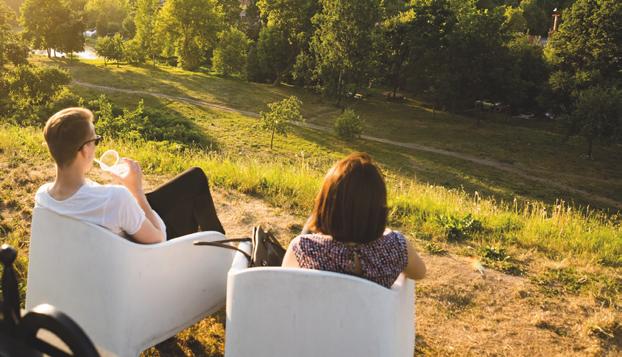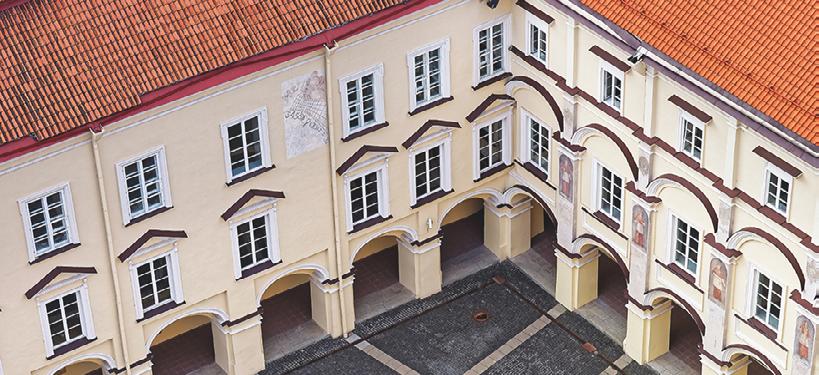
6 minute read
Health system
All foreigners holding a permanent residence permit in Lithuania, as well as those who are legally employed and temporarily residing in Lithuania, must pay monthly health insurance contributions, and in case of an insured event, have the right to receive free personal health care services. Individuals not covered by PSD are required to pay for health care services themselves.
Everyone – both insured and those not covered by PSD –have access to public, municipal as well as private health care institutions. The difference is that non-insured individuals are required to pay for all healthcare services provided in private, public and municipal health care institutions.
If you are employed and have a residence permit, your employer pays your PSD contributions for you. If you are self-employed, you should pay the PSD contributions individually
Unemployed individuals with a permanent residence permit can pay PSD individually.
If you have a temporary residence permit, you cannot be insured by PSD, unless you are employed or have worked in Lithuania for six months and have registered with the Employment Services after that.
If you are a student and an EU citizen, you are required to either have a European Health Insurance Card (EHIC) or S1 form confirming that you are insured in another EU country.
Students of non-EU member countries should obtain private health insurance. The cost of health insurance obtained in Lithuania may vary depending on the insurance policy.
First aid
Basic healthcare covers first aid and emergency medical services at clinics and hospitals. You do not need to have a GP’s referral to get basic healthcare.
Foreigners who do not have an employment relationship are not insured by the PSD and are obliged to cover their basic healthcare expenses themselves or ask for a reimbursement from the insurance company they chose before coming to Lithuania.
Free-of-charge basic healthcare in Lithuania is guaranteed for permanent residents and those insured by PSD.
Registering with a healthcare institution
There are both public and private healthcare institutions to choose from in Lithuania.
Public healthcare institutions belong to the Lithuanian national healthcare system. In many public clinics you can get medical services in English or Russian (it all depends on the doctor, so it’s wise to ask upon registration). In the event of illness, you should first contact the healthcare institution you are registered with and your GP will examine you, order medical laboratory tests, prescribe treatments and, if needed, refer you to a specialist for a consultation or hospitalisation. You should bear in mind that you usually need a referral from your GP to see a specialist.
Ready to register?
• Choose a health care institution (outpatient clinic, primary healthcare centre or family medical centre) and go to the healthcare facility of your choice.
• Provide your ID, fill out an application form and choose a practitioner.
Private healthcare institutions work under a license issued by the Ministry of Health. These institutions provide paid healthcare services. Their prices are set according to internal procedures. Some private health institutions can offer and apply discounts to individuals covered by compulsory health insurance and do not charge for the services provided (check before registering). They may also have concluded agreements with private health insurance companies concerning a direct reimbursement of fees for healthcare services. It’s easy to get medical services in English at private healthcare institutions.
If you have a late-night dental emergency, head to the Žalgiris Clinic. They’re open 24/7
Some of us are still nostalgic for our schooldays, and you can even catch Lithuanians starting the new year on 1 September, but don’t let it throw you off!
The school year in Lithuania starts in September and ends in June. Both teachers and students get to enjoy a nice and quiet summer off.
There are three main academic stages that almost everyone goes through.
Kindergarten/Pre-School
If you have small children, there are lots of kindergarten options in a number of languages. Here is the list of kindergartens offering services in foreign languages: govilnius.lt

Public kindergartens
• Starts at 1.5-2 years old.
• Municipally funded.
• Pre-school (nursery and kindergarten) education in public and municipality kindergartens benefits from partial public funding amounting to four hours per day or 20 hours per week.
• Admission to a public kindergarten is managed centrally: applications should be submitted electronically at svietimas.vilnius.lt by 10 March.
Private kindergartens
• Admission is all year round.
• Children can follow different curricula and various methodologies, such as Waldorf, Montessori.
• There are specialised private kindergartens oriented toward art, technology, Baltic traditions, outdoor kindergartens, etc.
• The municipality provides a EUR 100/month per child subsidy for families that choose to send their child to a private kindergarten.
• Prices range from EUR 200-1,600/month.
Primary and secondary education
The Lithuanian school system does not differ much from other European countries. There are 12 grades in Lithuanian primary and secondary education combined. And while children usually graduate at 17-18, the mandatory school age in Lithuania is 7 to 16.

Education is provided in Lithuanian, Russian, Polish, Belarusian and Hebrew. If you want to send your child to an English or French-speaking school, you will have to choose a private school.
To enrol into any school, there are a few forms that you will have to fill in. And sometimes (depending on the school) there will be some other acceptance conditions. Read more: renkuosilietuva.lt
It’s much easier logistically to choose the school closest to where you live. Check out the interactive map and then check this vacancy list, which is updated every month:
Relocating with a child of a school age? No problem!
• Bring documents from the school your child previously attended.
• The school will perform tests to determine the corresponding programme.
• There will be Lithuanian classes to bridge the language gap.
• There is 30% in additional funding for the first schoolyear.
• Admission can be granted at any time of the year.
Senior class students wishing to continue their studies in English have the possibility to be granted an International Baccalaureate diploma in the following schools in Vilnius:
• Vilnius Lyceum (licejus.lt)
• American International School of Vilnius aisv.lt
• Erudito licėjus erudito.lt
Extracurricular activities
There are plenty of extracurricular activities for school-age children. Some of them are organised by the school and teachers working there, municipality and others are held by private organisations. The most popular activities for school children in Lithuania are music school, art lessons, karate, football and dancing.
Tip from a local: If you have children of school age, you will most likely plan your holidays around their schedule. Lucky you, you can plan in advance!

Maybe you haven’t heard of every single university in Vilnius but trust us, world leaders in industries such as lasers and biotech are not born, they are made. And they are made here – in Vilnius!
Double degree diplomas with famous European universities, world-class visiting lecturers, hundreds of Erasmus possibilities and endless opportunities to learn… ah, it’s a good time to be a student!
Higher education in Lithuania is carried out in both Lithuanian and English (depending on the programme) and consist of three cycles: Bachelors, Masters and Doctor of Science/Doctor of Art.
Vilnius has a vast variety of study programmes to choose from, but there are many more reasons to choose Lithuania as your dream country for studies, and here they are: studyin.lt
Recognising foreign qualifications
If you have acquired a specific level of education and want to study at a Lithuanian institution of higher education, you should have your qualifications assessed and recognised by the appropriate institutions. Find out more about it here: renkuosilietuva.lt

Learning Lithuanian
We’re not going to lie, Lithuanian is quite difficult to learn! However, it’s worth learning it if you plan on staying in the country for a longer time. Several institutions organise Lithuanian language courses, and most are in Vilnius.
Convenience
Sending and receiving goods
POST
There’s something about sending and receiving goods that almost makes it feel like Christmas! And it’s always nice to enjoy a very well-developed postal system.
The main place to easily send and receive goods is the post office. It allows you to send registered, tracked packages all over the world! And it has its own branches – mini offices in every city of Lithuania. Post: post.lt
Parcel kiosks
For several years, locals have been making regular use of the very convenient and developed network of parcel kiosks. You can find Omniva (omniva.lt), LP Express (lpexpress.lt), Venipak (venipak.com) and DPD (dpd.com) kiosks all over the city.
Use them to quickly send and receive parcels within Lithuania, and even leave your keys in them for a flatmate to pick up.

Shopping:
Are you a fan of online shopping? We prepared a simple-to-navigate list for your next shopping spree from your couch!
All categories: Pigu.lt
Electronics: varle.lt; topocentras.lt; rde.lt; bigbox.lt; 1a.lt; novastar.lt
Home: senukai.lt; ermitazas.lt; ikea.lt; jysk.lt
Fashion: eavalyne.lt; open24.lt; aboutyou.lt; zalando.lt; soulz.lt
Pharmacies: eurovaistine.lt; gintarine.lt; camelia.lt
Second-hand goods: Vinted.lt; skelbiu.lt
Groceries: barbora.lt; rimi.lt
Food delivery: Bolt food; Wolt
Banking
The Lithuanian banking sector is mostly composed of well-established Scandinavian banks and you can open an account once you become a resident of Vilnius. You will be required to provide your identity card or passport, and with some banks, you might also need to provide proof of income and your relation to Lithuania (work contract, documents proving ownership of real estate in the Republic of Lithuania, study certificate, etc.).
Fees to open a bank account can vary and are upwards of up to EUR 400 for non-residents. Ready to open a bank account? Choose a bank and click on the link!
Feeling sick in the middle of the night? Have an urgent need to get rid of a headache or a fever? There are a few 24/7 pharmacies across Vilnius: BENU: Žirmūnų g. 64, and Eurovaistinė Mindaugo str. 11 and T.Ševčenkos str. 2

Swedbank (swedbank.lt)
SEB (seb.lt)
Luminor (luminor.lt)
Šiaulių Bankas (sb.lt)
Medicinos Bankas (medbank.lt)








